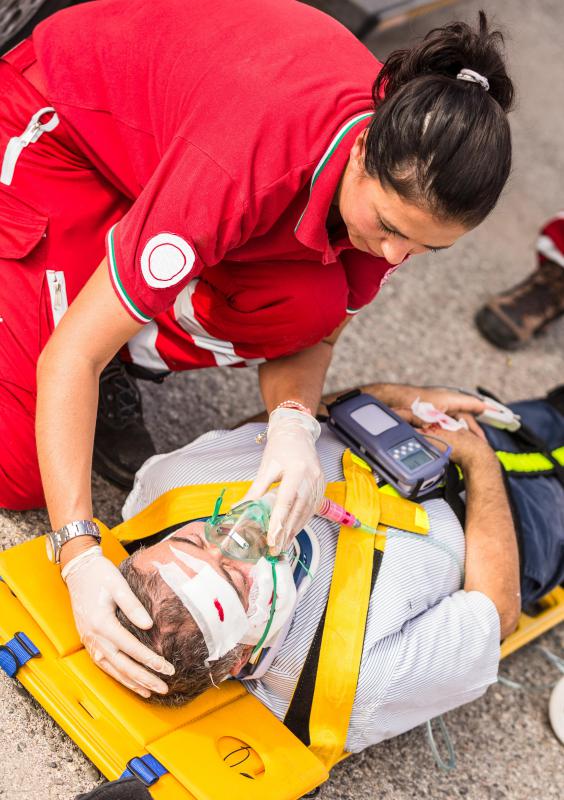At TheHealthBoard, we're committed to delivering accurate, trustworthy information. Our expert-authored content is rigorously fact-checked and sourced from credible authorities. Discover how we uphold the highest standards in providing you with reliable knowledge.
What Is a Lucid Interval?
A lucid interval is a period of time that a person with a head injury is conscious, after being knocked unconscious due to an impact. The interval lasts until they fall unconscious again. Unconsciousness follows, because during the interval, blood builds up on the brain causing extreme pressures on the brain tissue. A lucid interval ends with these pressures becoming so great that the person loses consciousness. They are at great risk of death if medical intervention is not quickly obtained.
For a lucid interval to occur, a person suffers a head injury, for example, a blow to the head. They are knocked unconscious for a few minutes and then awaken. Having suffered the injury, the person may be totally unaware of the seriousness of their condition. Awake and functioning normally, perhaps with a sore head that they associate with the knock they have received, they have an epidural hematoma progressing as minutes or hours go by.
Epidural hematoma is a bleed on the brain, where blood accumulates between the skull and the dura mater. The dura mater is a tough membrane covering the brain. Blood continues to build up, while the person is unaware of their condition.

The lucid interval is the interval or period of time that the injured person is lucid or conscious, and in many cases continuing to function relatively normally, before the effects of the epidural hematoma cause unconsciousness again. Blood continues to build up within the skull during the interval, until the pressure and compression force on the brain becomes so great that they lose consciousness. They are at risk of dying if medical help is not urgently obtained.

It is of vital importance to seek medical help after a head injury occurs, even if the injured person seems well. A lucid interval can create the illusion that the injured person has recovered, when in fact their condition is worsening. The effects of alcohol can also mask any symptoms of the epidural hematoma, such as head pain and nausea.
Under the supervision of a medical professional, the injured person is examined for head injury. A lucid interval may be occurring or the patient may be genuinely well, however the medical professional will perform tests such as an eye exam or brain scan, to look for symptoms. The patient usually undergoes a period of observation following the examination, to make certain that they are well. Having an epidural hematoma is fatal to 15 to 20% of people who suffer from it.
AS FEATURED ON:
AS FEATURED ON:















Discussion Comments
@indigomoth - Although, with that said, I'm not sure there is much you can do for someone who succumbs to a head injury like that if you aren't a doctor and don't have an operating room handy. Even the best brain surgeons can't always help when that kind of thing happens.
The only possible help you can be is if there is a brain bleed on the surface, putting pressure on the brain, and that's the only problem. In that case you might be able to make burr holes so the blood can drain out, but I don't know if that's ever been done by a non-doctor outside a TV show.
@MrsPramm - That's the reason that people who have had a head injury and aren't able to get to a doctor (perhaps because they are far from a hospital or trapped somewhere) are told to try to keep awake. It's actually not true that sleeping is bad for a concussion, the opposite is true. Sleeping is very good for your brain after you've had a shock, that's why you might keep trying to drift to sleep.
But, if a person falls asleep, it's much more difficult to tell if they have passed from a lucid interval into distress or not. Keeping them awake means that if they do fall unconscious, you'll be able to tell.
One of the saddest story lines I can remember on my favorite soap opera followed a couple who had taken a long time to get together. They were finally starting to be happy when they were involved in a car accident and the woman had what seemed to be a very slight bump on the head.
Because it was so slight, she waved off medical attention and they went home. Later that night she passed away.
I know it was only a TV show but it always stuck with me, because I'm sure that happens all the time and the guilt the person left behind would feel would be terrible. So, if you fall unconscious after a rap on the head, or even if it just seemed like a really big one, it's important to get it checked out, if not for your sake, then for the sake of the people who love you.
Post your comments